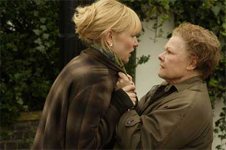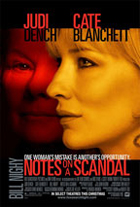Notes on a Scandal
|  Notes on a Scandal is a lurid psychodrama cleverly dressed up in art house garb. It plumbs the recesses of pathetic and sordid human behavior with a wry combination of gleeful deliciousness and arty pretension, making it the movie equivalent of a grocery store scandal rag penned by a Pulitzer Prize-winning novelist. Notes on a Scandal is a lurid psychodrama cleverly dressed up in art house garb. It plumbs the recesses of pathetic and sordid human behavior with a wry combination of gleeful deliciousness and arty pretension, making it the movie equivalent of a grocery store scandal rag penned by a Pulitzer Prize-winning novelist.In fact, the screenwriter behind Notes on a Scandal, British playwright Patrick Marber, has more than a few awards under his belt, as does Zoe Heller, the writer whose novel Marber adapted. These two writers are perfectly suited for the material: Marber specializes in stories about awful, miserable people making other awful people even more miserable (see his lauded play Closer, which was adapted to film in 2004 by Mike Nichols), and Heller was originally a journalist who wrote a confessional column for the Sunday Times for four years. And “confessional” is primarily what Notes on a Scandal is. The central character is Barbara Covett, an aging spinster schoolteacher played with wicked relish by Judi Dench. Barbara narrates the film from her diary entries, which she fills with nakedly blunt, overripe prose. Her diary entries paint the portrait of a woman who is simultaneously odious and pathetic. Clearly alone (except for her beloved cat--“standard issue” for someone like her, she says at one point) and exceedingly bitter, Barbara latches onto friendships with young, attractive women who supply a spark to her otherwise dull life. Her newest find is Sheba Hart (Cate Blanchett), the pretty new art teacher at the London prep school where Barbara is a literal institution. With her bright smile and bohemian clothes, Sheba glows in the dour, gray high school, and Barbara finds her irresistible. It doesn’t help that Sheba is warm and open, immediately letting Barbara into her confidence and introducing her to her family, which includes an older, slightly dowdy husband (Billy Nighy), a teenage daughter (Juno Temple), and a son with Down’s Syndrome (Max Lewis). One of the perverse pleasures of Notes on a Scandal is watching Barbara “perform” her role as friend and confidant while hearing her inner monologue, which is filled with snippy asides, casual dismissals, and sharp-tongued criticisms. The bond between Barbara and Sheba is cemented when Barbara discovers that Sheba is carrying on a clandestine relationship with one of her students, a 15-year-old boy named Steven Connolly (Andrew Simpson). Not only has Sheba crossed a moral boundary, but a legal one, as well, and Barbara uses this bold transgression as a kind of emotional blackmail, keeping Sheba close to her and threatening to expose her if she fails to meet her expectations. It’s a gruesome relationship, built entirely on lies, deceit, and manipulation, and we get to see every bit of its inner workings. From this standpoint, Notes on a Scandal is nastily effective. Director Richard Eyre (Stage Beauty) draws us in quickly and efficiently, using the sharply edited early scenes and Barbara’s acid-tongued narration to create an emotional atmosphere as gray and bleak as the constantly overcast London skies. He fills the early portions of the film with contrasts--Barbara’s exterior behavior versus her inner thoughts, the expectations of Sheba’s glamorous personal life versus the realities of being a wife and mother, the clammy excitement of illicit sex versus the realities of the emotional damage wrought from such relationships, and so on. It’s heady and cheaply sensational at the same time. Unfortunately, the film has a number of clunky moments and bits of narrative laziness that trip it up when its most ripe. For example, one tightly wrought scene in which Barbara has a near breakdown when Sheba is unable to be with her after the death of her beloved cat is undercut by Bill Nighy screaming furiously that they will be late to their son’s play. At this point, nothing has suggested that his character has such a temper, and it’s hard to tell if it’s a case of bad writing, bad acting, or if a scene explaining his anger management issues was left somewhere on the cutting room floor. Such a scene may be due in part to Marber’s tendency to mistake characters screaming at each other for well-wrought drama; it’s no surprise that when Sheba finally realizes Barbara’s true intentions that it results in a wild-eyed screamfest so violent that Sheba has to take it outside and literally rant to the sky while surrounded by the lecherous British tabloid press. Which also brings us to one of Notes on a Scandal’s most egregiously bad moments, which involves Sheba discovering an important piece of paper wadded up in Barbara’s wastebasket. Would someone as meticulous and single-minded as Barbara really leave an incriminating sheet of paper wadded up in a wastebasket where Sheba would easily find it? Yet, even with such jarring inconsistencies, it is hard to deny the overall effectiveness of Notes on a Scandal. It has a perverse and unapologetic interest in the deepest of human flaws and the nastiest of human behavior, which is undeniably fascinating, especially when embodied on screen by all that respectable Oscar bait. Copyright ©2007 James Kendrick Thoughts? E-mail James Kendrick All images copyright ©2006 Fox Searchlight Pictures |
Overall Rating: 

 (2.5)
(2.5)


